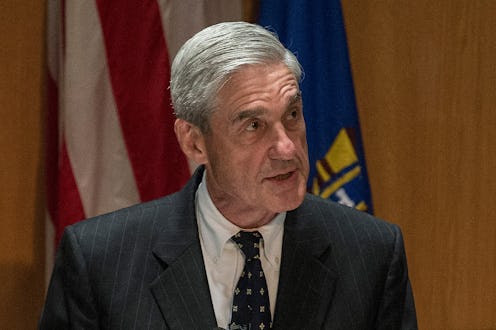News
The Mueller Investigation Is Apparently Wrapping Up Much Sooner Than You Think

The FBI's probe into the Trump campaign has raged on for more than a year, but Special Counsel Robert Mueller's investigation could end very soon. In fact, Bloomberg News reports that the probe is expected to conclude after the midterm election on Nov. 6. Whether or not the findings will be made public is another story, though.
Two anonymous U.S. officials told Bloomberg that Mueller is under pressure from his superiors to either charge more people with crimes related to President Donald Trump's 2016 campaign or wind down his operation. They said the special counsel will deliver his findings not long after the midterms, though it's unclear if those findings will implicate the president. The Department of Justice declined to comment.
Wrapping up the probe after Nov. 6 means there's a chance Democrats will have control of at least one body of Congress when Mueller reveals what he's dug up. While Democrats are more likely to take action against POTUS if Mueller does find evidence that he committed a crime, they could still struggle to convince the Senate — which is expected to remain under Republican control — to use Mueller's probe against Trump.
When the special counsel does issue his findings, they'll likely relate to two major questions, Bloomberg reports: Were there clear incidents of collusion between Russia and Trump’s 2016 campaign? And did the president obstruct justice during the probe?
Justice Department protocol stipulates that prosecutors should avoid making major decisions close to an election that could potentially influence the outcome, though Politico notes that there's no law stopping Mueller from issuing his findings before Nov. 6. Former FBI Director James Comey came under fire in 2016 for disclosing that the FBI would review more of Hillary Clinton's emails just 11 days before the presidential election. After Comey's decision was harshly criticized for allegedly skewing the election in Trump's favor, Mueller appears to be taking the opposite approach.
Aside from the midterms, what happens to Mueller's bosses could change the course of the investigation. Rumors have swirled that Deputy Attorney General Rod Rosenstein may either resign or be fired, though neither has happened yet. Rosenstein currently holds the power to decide how much of Mueller's probe is passed along to Congress, as Bloomberg notes, and Trump replacing the deputy attorney general could drastically alter how much information lawmakers see.
Then there's Attorney General Jeff Sessions, Rosenstein's boss. Trump hasn't spoken kindly of Sessions recently, saying in an interview with Hill.TV last month that he's "so sad over Jeff Sessions." Either Justice Department official's departure could throw a wrench in Mueller's entire probe.
Though the president has repeatedly called the Mueller investigation a "witch hunt," Mueller hasn't backed off, and another indictment could prolong the probe while the prosecution played out. Mueller has indicted more than two dozen people thus far, and at least six people are cooperating with the FBI.
Trump attorney Rudy Giuliani told the New Yorker last month that the White House would try to block Mueller's report from being released. Indictments are inevitably made public, however.